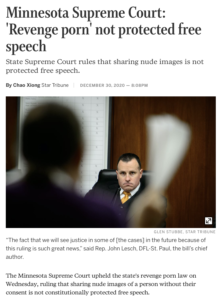 The law has historically ignored the damage done to parties by angry ex-partners, set on embarrassing them with nude photos. However, the law is changing. In 2016, John Lesch spearheaded a bill to make revenge porn a crime in Minnesota. The bill became law and is now codified as Minn. Stat. § 617.261. In fact, the Minnesota Supreme Court recently upheld the law, noting that free speech does not protect the dissemination of revenge porn.
The law has historically ignored the damage done to parties by angry ex-partners, set on embarrassing them with nude photos. However, the law is changing. In 2016, John Lesch spearheaded a bill to make revenge porn a crime in Minnesota. The bill became law and is now codified as Minn. Stat. § 617.261. In fact, the Minnesota Supreme Court recently upheld the law, noting that free speech does not protect the dissemination of revenge porn.
Also, in the same year, a parallel law was enacted that allowed victims of revenge porn to receive monetary damages. This bill was codified as § 604.31 and now allows persons whose nude images have been disseminated without their consent to sue the person disseminating the images. This law also allows persons that have suffered because they have had someone else non-consensually solicit sexual acts on their behalf to sue for damages. This means the poster of internet, newspaper or other types of advertisements or solicitations posted on someone’s behalf without their consent can be held liable for the damage the post causes to a person. For example, this means the bathroom wall scrawler in Tommy Tutone’s “867-5309/Jenny” could be in legal trouble.
Minn. Stat. § 604.31 reads:
Subdivision 1. Nonconsensual dissemination of private sexual images.
(a) A cause of action against a person for the nonconsensual dissemination of private sexual images exists when:
(1) a person disseminated an image without the consent of the person depicted in the image;
(2) the image is of an individual depicted in a sexual act or whose intimate parts are exposed in whole or in part;
(3) the person is identifiable:
(i) from the image itself, by the person depicted in the image or by another person; or
(ii) from the personal information displayed in connection with the image; and
(4) the image was obtained or created under circumstances in which the person depicted had a reasonable expectation of privacy.
(b) The fact that the individual depicted in the image consented to the creation of the image or to the voluntary private transmission of the image is not a defense to liability for a person who has disseminated the image without consent.
Subd. 2. Nonconsensual sexual solicitation.
A person who uses the personal information of another to invite, encourage, or solicit sexual acts without the individual’s consent and knows or has reason to know it will cause the person whose personal information is used to feel harassed, frightened, threatened, oppressed, persecuted, or intimidated, is liable for damages to the individual whose personal information was published or disseminated publicly.
The statute goes on to state that a person may ask for an injunction to stop a person from further disseminating the image, in addition to asking for damages.
If a person is found liable of violating the statute, they can be penalized for any financial losses the victim suffered due to the dissemination of the image, may have to turn over any profit they gained from the images to the victim, can be ordered to pay a civil penalty to the victim of up to $10,000.00, and might be responsible for court costs and the victim’s attorney’s fees.
However, there are exceptions to this rule. A person cannot be held liable for disseminating public images when:
-the dissemination occurred in the course of a criminal prosecution or investigation;
-the dissemination occurred during a report of unlawful conduct;
-the dissemination was done in the course of seeking medical treatment and the dissemination has since stopped;
-the image was obtained in the course of legal business;
-the image involves exposure within public;
-the image involves a “matter of public interest”;
-the image is used for scientific or educational purposes; or
-the image is disseminated within the course of legal proceedings.
Because this law is new, many questions about the scope of this law exist that are likely to be litigated within the coming years. While definitions for terms in the law exist, like with most new legislation, it is likely that the exact meaning of the statute will be hotly debated. Courts will likely have to answer questions about definitions of terms, and whether intent is required to be found liable.
While “intimate parts” are defined in statute as “genitals, pubic area, or anus of an individual, or if the individual is female, a partially or fully exposed nipple,” “pubic area” could encompass varying levels of nudity. As courts continue to litigate this issue, exactly what counts as “intimate parts” is likely to be honed.
Similarly, “exposure within public” is likely to be debated. Is a private club a public area? What about a consensual sexual encounter with more than two people? What about a sexual encounter with twenty people present for the encounter?
“Dissemination” means distribution to one or more persons, other than the person who is depicted in the image, or publication by any publicly available medium. However, there is no intent requirement written into the statute. If an image is accidentally disseminated, say through accidental forwarding or a theft of these images, does this accidental dissemination constitute a potential civil action under the statute?
“Image” is defined in law as a photograph, film, video recording, or digital photograph or recording. However, what about a 3D printed model of a person’s intimate parts? What if the person is clearly nude, but their intimate parts are blurred? As technology continues to evolve and cases start to crop up, courts will likely answer these questions.
We’re Available 24/7 – Get help with your criminal non-consensual sexual image dissemination charge or civil action today.
Whether your non-consensual sexual image dissemination issue is civil or criminal contact John Lesch today. John Lesch wrote the bill on non-consensual dissemination of sexual images and is uniquely qualified to represent you in your case. Further, John is an experienced attorney who will be able to understand the nuances of the law to find the best outcome possible for your case.


